Sorted by date Results 1 - 25 of 70

Latest selections expand potential fuel sources for 2026 test reactors. Marking the second round of selections under its Fuel Line Pilot Program, the U.S. Department of Energy has advanced four more companies to develop domestic nuclear fuel lines, extending federal efforts to fast-track the reactors slated for initial operation in 2026. Over the past year, the U.S. Department of Energy (DOE) has taken a series of steps to reestablish the nuclear fuel cycle inside America's... Full story

Second round to back advanced reactor testing and fuel lines. Following its first round of allocations to five developers earlier this year, the U.S. Department of Energy has conditionally committed high-assay low-enriched uranium (HALEU) to three additional companies advancing microreactor, TRISO (TRi-structural ISOtropic) fuel, and molten salt technologies. Driven by the ban on Russian uranium imports and the urgent need to establish a secure nuclear fuel cycle, DOE has... Full story

Framework sets rules for joint planning across the nuclear fuel supply chain. Seeking to end America's dependence on foreign uranium, the U.S. Department of Energy is launching a new consortium under the Defense Production Act that will unite companies across the nuclear fuel cycle to secure a reliable supply for the nation's reactors. In the last several years, America's nuclear sector has faced the dual challenge of surging electricity demand from data centers and advanced... Full story

Demonstrates far higher energy yield than conventional uranium fuels. Pushing forward a potential alternative to conventional nuclear fuel, Clean Core Thorium Energy Inc. has reached a new testing milestone at Idaho National Laboratory, where its thorium-based design demonstrated performance levels far beyond those of standard heavy water reactor fuels. For more than half a century, uranium has powered the reactors that supply roughly 10% of the world's electricity. Due to... Full story
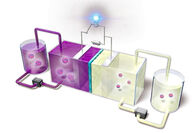
Prototype uranium battery reimagines nuclear waste as energy storage. Converting a global stockpile of nuclear byproduct into a novel form of energy storage, researchers at the Japan Atomic Energy Agency (JAEA) have developed the world's first rechargeable battery powered by depleted uranium – a prototype that reimagines radioactive waste as a potential asset for future energy systems. Undergoing a complex and carefully managed preparation process before entering a reactor, n...
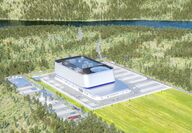
TVA has taken an exciting step toward pioneering small modular reactors in the U.S. As the United States works to expand its next-generation nuclear capabilities, the first utility-led small modular reactor project has entered formal review, with the Nuclear Regulatory Commission docketing the Tennessee Valley Authority's construction permit application for a GE Hitachi BWRX-300 reactor at its Clinch River site in Tennessee. Developed to provide carbon-free electricity at...

Startup just raised $50 million to convert heat from radioactive decay into electricity. Zeno Power, a startup based in Seattle and Washington, DC, raised $50 million to commercialize nuclear batteries designed to power equipment and vehicles in some of the most remote and extreme places on Earth and beyond. Called radioisotope power systems (RPS), these nuclear batteries convert heat from radioactive decay into electricity. The technology isn't new; NASA has used it for...
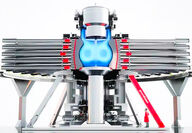
Company advances from plasma formation to compression in fusion prototype. Following its initial plasma milestone earlier this year, General Fusion Inc. successfully compressed magnetized plasma with a liquid lithium liner inside its Lawson Machine 26 fusion reactor – a critical advance toward demonstrating the viability of its magnetized target fusion technology. As the dream of nuclear fusion appears to grow closer each day, General Fusion continues to advance a t...

PyroDelta road tests a tellurium-enhanced thermoelectric alternator-radiator for ICE vehicles. A tellurium-based thermoelectric generator developed by First Tellurium subsidiary PyroDelta Energy has exceeded expectations during real-world tests, signaling a leap forward for powering and cooling internal combustion and hybrid vehicles. "The real-world results have surpassed expectations," said First Tellurium President and CEO Tyrone Docherty. Thermoelectric generators,...
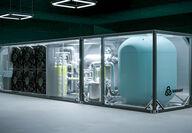
Backing will bring portable nuclear Kaleidos closer to 2026 trial. With support from the U.S. Department of Energy and $225 million in private investment, California-based startup Radiant Industries, Inc. is preparing to test Kaleidos, the world's first mass-producible 1-megawatt portable nuclear microreactor. After decades of stalled innovation, shifting public opinion, and growing urgency around climate and energy security, the United States has reentered the global race to...

Researchers successfully develop a bio-inspired thermoelectric cement composite. Buildings may be on the way to powering themselves thanks to a new cement that can turn absorbed heat into electricity. A research team at Southeast University in China has published a report on a novel bio-inspired cement-hydrogel composite with superior structural integrity that can also generate and store energy, potentially creating self-sustaining structures. This breakthrough could lead to...

Researchers at the Autonomous University of Querétaro design sustainable cell. Researchers in Mexico at the Autonomous University of Querétaro (UAQ) have unveiled a new thin-film solar cell design capable of converting more than twice the standard percentage of sunlight into usable electricity, using only Earth-abundant, non-toxic materials in a breakthrough that could help reshape the solar industry and accelerate the global shift away from fossil fuels. A standard c...

Federal stockpiled fuel allocation backs next-gen nuclear deployment. After years of planning, policy, and preparation, the U.S. Department of Energy is delivering the first batches of high-assay low-enriched uranium (HALEU) from stockpiles to five advanced reactor developers – marking the first time this critical fuel has been released for commercial use and signaling a major shift in the nation's push to deploy next-generation nuclear technologies and reclaim control over it... Full story

Transition from diesel and gas to renewable energy by 2030 will take a total capacity of 1,500 MW of solar. Former CEO and current chairman of Fortescue Metals Group Andrew Forrest has presented plans for one of Western Australia's largest solar farms to forward the company's goal of eliminating its use of fossil fuels by 2030; powering its extensive iron ore operations with clean energy is a major step in this direction. Fortescue made headlines back in 2022 with a bold pledg...
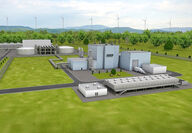
Partnership sets stage for large-scale reactor production. As part of a push to accelerate the global rollout of next-generation nuclear power, a new strategic partnership between TerraPower and HD Hyundai will expand manufacturing capacity for key components of the Natrium reactor, a sodium-cooled system designed for rapid deployment and integration into modern energy grids. Launched in 2008 with backing from Bill Gates, TerraPower has positioned itself at the forefront of ad...

Reissues funding for small reactor deployment to meet rising AI-era energy needs. Amid growing urgency to strengthen domestic energy infrastructure and secure long-term energy independence, the U.S. Department of Energy has reissued a $900 million funding opportunity to accelerate the deployment of small modular nuclear reactors, a move aimed at expanding America's clean energy capacity and meeting surging power demand driven by AI, data centers, and industrial growth.... Full story
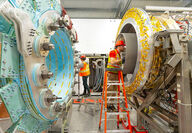
Prototype LM26 target fusion reactor aims for energy breakeven. For the first time, General Fusion Inc. has successfully generated and sustained magnetized plasma inside its Lawson Machine 26 MTF fusion reactor – an achievement that places the company among the few to reach this stage in the pursuit of commercial fusion power. Founded in 2002 by Canadian physicist Michel Laberge, General Fusion has spent over two decades pushing the boundaries of fusion energy, working to t...
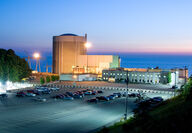
From reactor restarts to clean hydrogen, DOE gives nuclear watchlist. Building on the previous year of unprecedented progress for U.S. nuclear energy, 2025 is shaping up to be a defining year for the industry, with the U.S. Department of Energy spotlighting five critical developments that could redefine the energy landscape of America. The many successes achieved in nuclear energy during 2024 – from the commissioning of a new reactor to new breakthroughs in reactor design a...
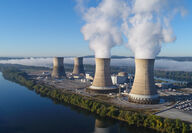
New projects and innovations strengthen U.S. nuclear energy for the future. With a series of significant advancements and strategic investments, 2024 is shaping up to be a defining year for the U.S. nuclear sector as the momentum built over the past few years continues with the activation of new reactors and substantial efforts in securing a domestic fuel supply. These developments highlight the growing role of nuclear power as a crucial component of the nation's clean energy...

Next steps focus on research and drilling in highly prospective areas. For decades, scientists have contended with the idea that naturally occurring geologic hydrogen – an abundant, clean-burning fuel – is a resource too elusive to use as an energy source despite its promise as a tailor-made alternative to fossil fuels for vehicles and high-heat industrial applications like smelting. While nations work to tap manmade hydrogen's potential, a comprehensive map from the U.S. Geo...

Space-age cathodes have what it takes to power modular nuclear fusion reactors here on Earth. Carbon fiber cathodes were initially designed to withstand extreme conditions found in aerospace and defense applications. Now they may be a key ingredient in the next generation of plentiful and affordable clean energy. KULR, a provider of advanced thermal management solutions, recently announced the development of proprietary carbon fiber cathodes for a prominent nuclear fusion...

Rice researchers develop a highly efficient thermal emitter key to thermophotovoltaic systems that convert heat to electricity. Scientists at Rice University have delved into the realm of quantum physics to develop a highly efficient thermal emitter that provides macro-world solutions for capturing and storing clean energy. Built on a platform made of tungsten, the thermal emitter developed by the Rice research team is a key component of thermophotovoltaic (TPV) systems,...

Global industry leaders meet in Australia to drive high-temperature processes emissions down to net zero. Industry experts worldwide are attending the High Temperature Minerals Processing (HiTeMP) Forum this week at the University of Adelaide in Australia to tackle the challenge of decarbonizing energy-intensive industries in an environment of cooperation and idea sharing. This fourth gathering of the Forum united stakeholders to share their latest developments and...

Funding supports deconversion essential for nuclear fuel supply chain. Amid growing efforts to secure a reliable domestic nuclear fuel supply, the U.S. Department of Energy has awarded contracts to six companies as part of an $800 million initiative to bolster the deconversion of high-assay low-enriched uranium (HALEU), a critical component of the supply chain for advanced nuclear reactors. Over the past few years, the U.S. has been actively working to elevate nuclear energy...

Granite Creek assembles the catalyst-rich projects, scientific expertise to become a first mover in the geological hydrogen space. A belt of rocks spanning the Southeast Alaska Panhandle hosts at least a dozen prospects and deposits enriched with nickel, copper, and platinum group metals (PGM) needed for the energy transition. Could these projects also host hidden stores of geological hydrogen that could offer a clean-burning fuel for the 21st century? Granite Creek Copper... Full story